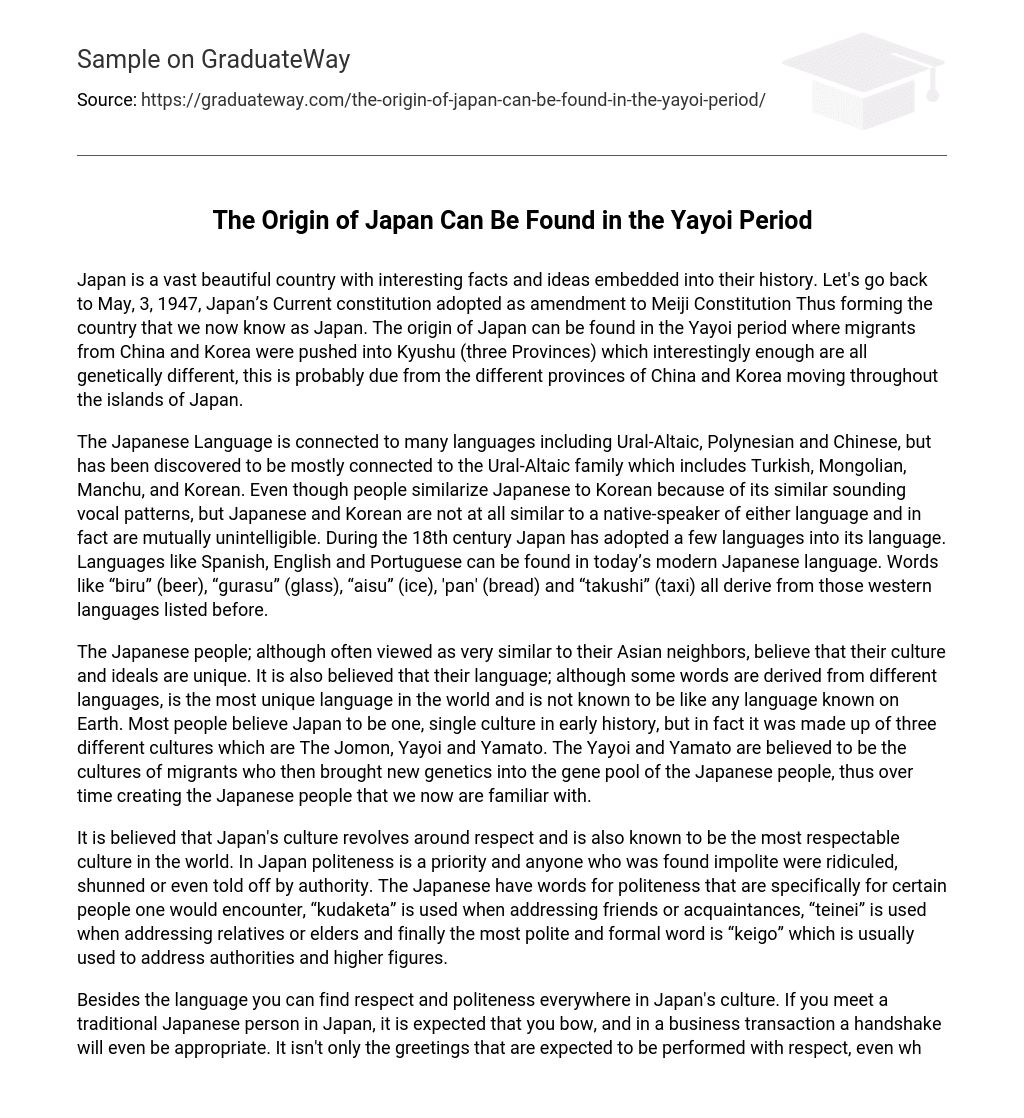Japan is a vast beautiful country with interesting facts and ideas embedded into their history. Let’s go back to May, 3, 1947, Japan’s Current constitution adopted as amendment to Meiji Constitution Thus forming the country that we now know as Japan. The origin of Japan can be found in the Yayoi period where migrants from China and Korea were pushed into Kyushu (three Provinces) which interestingly enough are all genetically different, this is probably due from the different provinces of China and Korea moving throughout the islands of Japan.
The Japanese Language is connected to many languages including Ural-Altaic, Polynesian and Chinese, but has been discovered to be mostly connected to the Ural-Altaic family which includes Turkish, Mongolian, Manchu, and Korean. Even though people similarize Japanese to Korean because of its similar sounding vocal patterns, but Japanese and Korean are not at all similar to a native-speaker of either language and in fact are mutually unintelligible. During the 18th century Japan has adopted a few languages into its language. Languages like Spanish, English and Portuguese can be found in today’s modern Japanese language. Words like “biru” (beer), “gurasu” (glass), “aisu” (ice), ‘pan’ (bread) and “takushi” (taxi) all derive from those western languages listed before.
The Japanese people; although often viewed as very similar to their Asian neighbors, believe that their culture and ideals are unique. It is also believed that their language; although some words are derived from different languages, is the most unique language in the world and is not known to be like any language known on Earth. Most people believe Japan to be one, single culture in early history, but in fact it was made up of three different cultures which are The Jomon, Yayoi and Yamato. The Yayoi and Yamato are believed to be the cultures of migrants who then brought new genetics into the gene pool of the Japanese people, thus over time creating the Japanese people that we now are familiar with.
It is believed that Japan’s culture revolves around respect and is also known to be the most respectable culture in the world. In Japan politeness is a priority and anyone who was found impolite were ridiculed, shunned or even told off by authority. The Japanese have words for politeness that are specifically for certain people one would encounter, “kudaketa” is used when addressing friends or acquaintances, “teinei” is used when addressing relatives or elders and finally the most polite and formal word is “keigo” which is usually used to address authorities and higher figures.
Besides the language you can find respect and politeness everywhere in Japan’s culture. If you meet a traditional Japanese person in Japan, it is expected that you bow, and in a business transaction a handshake will even be appropriate. It isn’t only the greetings that are expected to be performed with respect, even while talking people are expected to nod to show that they understand the speaker and avoid eye contact at all times. It is also very important to know that touching a Japanese person is a very big No-no in Japan, in fact all signs of physical affection is not recommended when greeting people.
Just like the Japanese people, the food must also be treated with respect and cooked properly. Since Japan is an island, fish and wheat was a major resource, which made fish and wheat the main ingredient in their food which gave birth to most of the food we all love today like Sushi or Ramen. Japan believes family to be important which is why it is required for every dinner to sit with your intermediate family. The relationship with intermediate family is something that makes Japan special from its neighbors like South Korea and China where they maintain a relationship with the whole family like aunts, uncles, cousins..etc.
There are some quirks in Japanese culture I feel the need to address. One weird but common superstition in Japan is the number four, it is recommended to restrain from using four because the Japanese believe it to be the connotation of death. Another thing to note is that when a Japanese person says ‘maybe’ it is mostly used to say no politely.
Since Japan has the lowest crime rate in the world, one must wonder what the cause of this is. Japan’s penalty for most crimes is death, which makes criminals too scared to carry out illegal deeds. Thanks to Japan’s Capital Punishment, people can enjoy luxuries that us Americans and most people can’t enjoy. These luxuries include not worrying about locking doors, which in japan most door don’t even have locks, another luxury is walking anywhere at any time of the day which for Japanese women is a real luxury almost no women get in other parts of the world.
Holidays in Japan is, of course, days set aside to respecting people. These holidays include Childrens Day, Respect for the Aged day, The Emperor’s Birthday..Etc. Christmas is also celebrated in Japan but not how we celebrate it in America. A Japanese Christmas usually consists of hanging out with friends, sometimes even family.
America and Japan have a lot of differences let alone political, but I will be naming a few of them here. One major difference that has some people outraged is the mistreatment of women and minorities in the work place which is still common in America but not as public as in Japan. Another difference is the recent removal of major corporations in Japan which both helped and diminish Japans economy.
Though there is a lot of quirks in Japanese culture, I truly believe Japan has reached our perception of what utopia is and America should take some notes on how to improve because Japan is way advanced than us, both with societal and technological advances we can’t possibly imagine achieving at the time we are living in, Which for Japan doesn’t seem like a problem.





